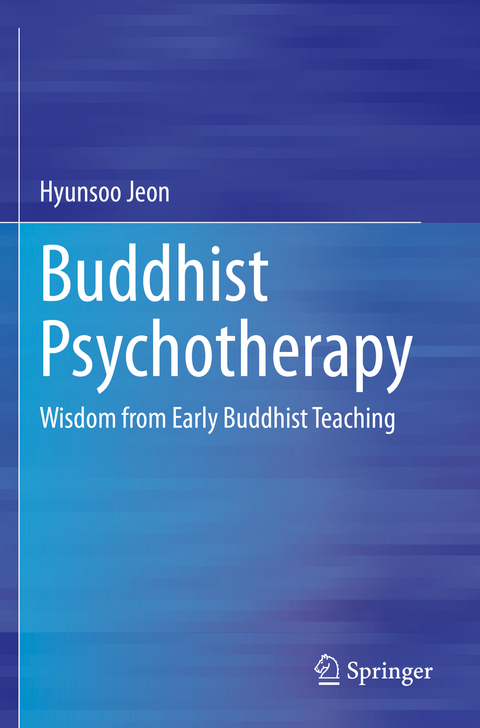
Buddhist Psychotherapy
Springer International Publishing (Verlag)
978-3-030-63100-0 (ISBN)
This book explores how to utilize Buddhism in psychotherapy and how Buddhism itself acts as a form of psychotherapy, using Buddhism practices as a lens for universal truth and wisdom rather than as aspects of a religion. Based on the author's over 30 years of study and practice with early Buddhism and his experiences of Buddhism with his patients, the book outlines a new form of psychotherapy incorporating three Buddhist principles: the properties of the body and mind, the principle of world's movement, and living with wisdom. This technique provides a unique perspective on mental health and offers new approaches for clinicians and researchers to effectively addressing mental health and well-being.
lt;p> Dr. Hyusoo Jeon -- born 1956 in Pusan in Korea he became a psychiatrist and psychotherapy specialist after graduating from Busan National University School of Medicine, and receiving neuropsychiatry training at the Soonchunhyang University Hospital. He attended Hanyang University Medical School where he obtained his master' and doctoral degrees. He was introduced to Buddhist teachings two years after becoming a neuropsychiatry resident. After that, he met with patients and studied Buddhism concurrently, using Buddhist wisdom to aid him in treating his patients. The use of Buddhist wisdom was so effective that he detailed his experiences in his books.
In 1990, he opened Hyunsoo Jeon Psychiatry Clinic. In 2003, he took a month off from his clinic to go to Burma to partake in Vipassana training. Later that year, he gathered specialists in Buddhism, psychology, and psychiatry to study together and hold discussions,(.) This gathering developed into the Korean Association of Buddhism and Psychotherapy in 2007. In March 2009, he took a year off from therapy to practice Buddhism, travel, and write books. In March 2010, he reopened his clinic and return to helping patients. He also spent two years practicing samatha and vipassana at Myanmar and Korea.
He has authored the following books in Koran and English: Cry When You Want to Cry and A Psychiatrist's Wisdom from the Buddha: Stories of Healing the Mind, A Psychiatrist's "Guidebook for the Mind,", collaborated in writing Value of Labor: A Buddhist Perspective(all in Korean), and Samatha, Jhana, and Vipassana: practice at the Pa-auk monastery; a meditator's experience ( in English, published in Wisdom Publications in America) as well as translating Mark Epstein's book Thoughts without a Thinker into Korean.
He was awarded the prestigious Grand Prize of Wonhyo Scholar Prize by Korean Buddhist Promotion Institute for his contribution of useful application of Buddhism to the modern society in 2018.
Chapter 1. What is Buddhist Psychotherapy?.- Chapter 2. The First Principle of Buddhist Psychotherapy: The Properties of the Body and Mind.- Chapter 3.The Second Principle of Buddhist Psychotherapy: The Principles of the World's Movement.- Chapter 4. The Third Principle of Buddhist Psychotherapy: Living with Wisdom.- Chapter 5. Understanding People with Mental Problems.- Chapter 6. Methods of Buddhist Psychotherapy.- Final words.
| Erscheinungsdatum | 07.01.2022 |
|---|---|
| Zusatzinfo | XVII, 157 p. 1 illus. |
| Verlagsort | Cham |
| Sprache | englisch |
| Maße | 155 x 235 mm |
| Gewicht | 279 g |
| Themenwelt | Geisteswissenschaften ► Psychologie ► Klinische Psychologie |
| Geisteswissenschaften ► Religion / Theologie ► Buddhismus | |
| Medizin / Pharmazie ► Medizinische Fachgebiete ► Psychiatrie / Psychotherapie | |
| Schlagworte | Buddhism • Buddhist Psychotherapy • living with wisdom • Mental Health • Mind • Mindfulness • psychotherapy • Suffering • wisdom • world movement |
| ISBN-10 | 3-030-63100-1 / 3030631001 |
| ISBN-13 | 978-3-030-63100-0 / 9783030631000 |
| Zustand | Neuware |
| Haben Sie eine Frage zum Produkt? |
aus dem Bereich


